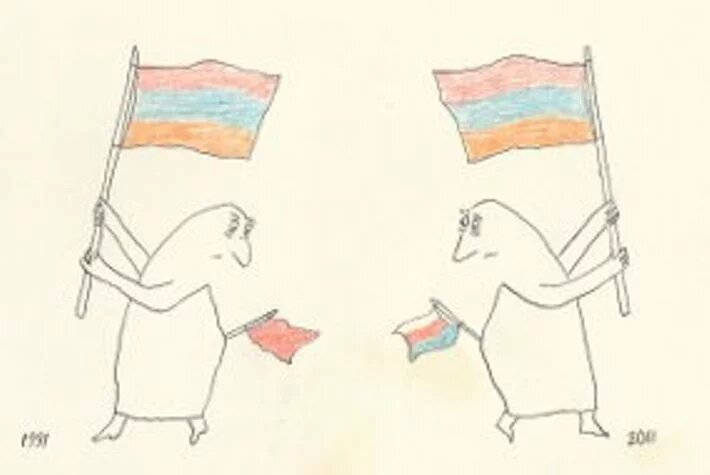
In a year which has seen positive developments for Armenia, namely an improved media landscape, fairer elections, and lasting economic growth, last week the government of Prime Minister Tigran Sargsyan returned to its long tradition of blundering. At least that's what Brussels thinks. Just one month after Vladimir Putin's official visit to Azerbaijan, where the chance for signing a binding trade agreement between Baku and Moscow was squandered, the Russian president welcomed his Armenian counterpart in Moscow. It's the latter who made headlines on September 3rd by surprisingly announcing that Armenia would join the Russian-led Customs Union.
Just ten weeks before the EU summit with the members of the Eastern Partnership program (Armenia, Azerbaijan, Belarus, Georgia, Moldova and Ukraine) in Vilnius, the country is moving away from a possible signing of the Association Agreement with the European Union. Before Sargsyan's visit to Moscow, Armenia (alongside Georgia and Moldova) was seen as a likely contender for taking the momentous step. But Sargsyan's announcement means that Armenia doesn't fulfill the conditions of accession anymore. Partner states need to have sovereignty over their economic and trade policies, a requirement which would be annulled should the country join the Customs Union.
Sargsyan says that as a member of the Collective Security Treaty Organization (CSTO), also presided by Russia, Armenia needs to make economic commitments, too. The strong military and financial dependence on Russia is well-known; due to a lack of diplomatic relations with Azerbaijan and Turkey, there is no economic exchange between Armenia and the two neighboring countries. For its loyalty towards Moscow, the South Caucasian republic is rewarded with cheap energy and weapon supplies.
Above all, the Kremlin offers Yerevan support in the “frozen” Nagorno-Karabakh conflict: as long as Russian soldiers are stationed in Armenia (currently appr. 5 000), Azerbaijan's military threats are unlikely to materialize. Meanwhile, Vigen Sargsyan, the President's chief of staff, shows optimism in view of the upcoming EU summit: the integration into the EU remains at the core of Armenia's foreign policy, he insists.
In Yerevan, several activists were seized by the police during protests against an entry into the Customs Union. Critics, among others opposition members, fear that the announcement could mark a withdrawal from the democratic reforms to which Sargsyan's government has committed in the past few months – unlike the Association Agreement, membership in the Customs Union stipulates no democratic reforms. Stefan Füle, European Commissioner for Enlargement and European Neighbourhood Policy, also voiced his concern: he called the decision a U-turn and pointed to the incompatibility of the treaties.
To many observers, the episode is proof for the political pressure that Russia exerts on its partners: Elmar Brok, MP in the European Parliament and chairman of its Foreign Affairs Committee, even speaks of “blackmail”.
Russia misses its target
The remaining candidates for a signing of the EU treaty see Armenia's slip as a chance to attract attention. Ukrainian President Viktor Yanukovych called for an overhaul of relevant legislation on the day of Sargsyan's announcement. In spite of growing pressure from Moscow, the country seems to be opting for the EU's Association Agreement. After an ambivalent statement from Georgian Prime Minister Bidzina Ivanishvili on the Customs Union, Minister for Foreign Affairs Maia Panjikidze stressed that joining the Customs Union was not an option. Georgia's relations with Russia have been strained for years. Ivanishvili, in office since 2012, is seeking mitigation.
In early 2013 it became clear that Armenia's ambiguous foreign policy would soon reach its limits. Both the Kremlin and Catherine Ashton, Vice-President of the EU Commission, signaled that an entry into both alliances was not up for discussion. Still, few observers expected that the Armenian government would decide in favor of Moscow. In late July Yerevan and Brussels finished negotiating the terms for a mutual trade agreement; a cornerstone of the Association Agreement, which would allow Armenia to better conform to EU standards and was originally set to be signed in Vilnius on the 29th of November.
Whether the treaty could now be rephrased for a strictly political cooperation, as suggested by Sagrsyan's chief of staff, is unclear (this would presuppose an exclusion of the trade agreement). At any rate, with Sargsyan's visit, Armenia's hopes for a successful Eastern Partnership summit have faded. If Sargsyan keeps his word and Armenia joins the Customs Union (the Parliament still needs to agree to the move), then the South Caucasian republic will have to celebrate its move with Russia alone.
Most observers agree that the episode was mainly a Russian wake-up call for Ukraine. Without (the intended) effect, it seems, as Kiev appears to have taken it as a goad to accelerate EU integration. Alexander Iskandaryan, political scientist and head of the Caucasian Institute in Yerevan, thinks that Putin wanted to score abroad to distract from problems at home. Russia is a warrantor of safety for Armenia and thus also for Nagorno-Karabakh. In parallel, Moscow supplies weapons to the economically superior Azerbaijan which lives off its lucrative oil exports. A closer look at Armenia's geopolitical standing reveals that economically, the Customs Union doesn't make much sense for the small republic. Even for Russia the Customs Union will hardly pay off: with the treaty, the country is binding itself to backward economies and moving towards political isolation. With the smallest Caucasian republic, Russia has bet on the wrong horse.